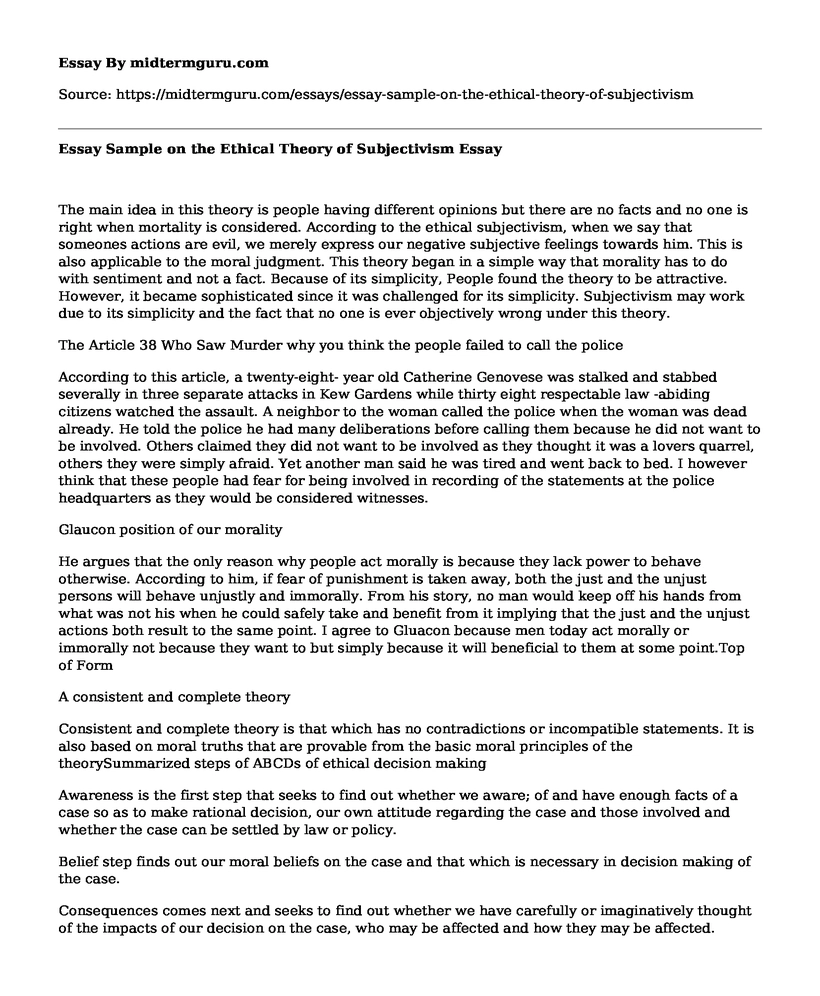The main idea in this theory is people having different opinions but there are no facts and no one is right when mortality is considered. According to the ethical subjectivism, when we say that someones actions are evil, we merely express our negative subjective feelings towards him. This is also applicable to the moral judgment. This theory began in a simple way that morality has to do with sentiment and not a fact. Because of its simplicity, People found the theory to be attractive. However, it became sophisticated since it was challenged for its simplicity. Subjectivism may work due to its simplicity and the fact that no one is ever objectively wrong under this theory.
The Article 38 Who Saw Murder why you think the people failed to call the police
According to this article, a twenty-eight- year old Catherine Genovese was stalked and stabbed severally in three separate attacks in Kew Gardens while thirty eight respectable law -abiding citizens watched the assault. A neighbor to the woman called the police when the woman was dead already. He told the police he had many deliberations before calling them because he did not want to be involved. Others claimed they did not want to be involved as they thought it was a lovers quarrel, others they were simply afraid. Yet another man said he was tired and went back to bed. I however think that these people had fear for being involved in recording of the statements at the police headquarters as they would be considered witnesses.
Glaucon position of our morality
He argues that the only reason why people act morally is because they lack power to behave otherwise. According to him, if fear of punishment is taken away, both the just and the unjust persons will behave unjustly and immorally. From his story, no man would keep off his hands from what was not his when he could safely take and benefit from it implying that the just and the unjust actions both result to the same point. I agree to Gluacon because men today act morally or immorally not because they want to but simply because it will beneficial to them at some point.Top of Form
A consistent and complete theory
Consistent and complete theory is that which has no contradictions or incompatible statements. It is also based on moral truths that are provable from the basic moral principles of the theorySummarized steps of ABCDs of ethical decision making
Awareness is the first step that seeks to find out whether we aware; of and have enough facts of a case so as to make rational decision, our own attitude regarding the case and those involved and whether the case can be settled by law or policy.
Belief step finds out our moral beliefs on the case and that which is necessary in decision making of the case.
Consequences comes next and seeks to find out whether we have carefully or imaginatively thought of the impacts of our decision on the case, who may be affected and how they may be affected.
Finally the decision step examines whether our decisions; are based on consequences that may occur, rhyme with our moral beliefs and we have no objection to the case.
Cite this page
Essay Sample on the Ethical Theory of Subjectivism. (2021, May 21). Retrieved from https://midtermguru.com/essays/essay-sample-on-the-ethical-theory-of-subjectivism
If you are the original author of this essay and no longer wish to have it published on the midtermguru.com website, please click below to request its removal:
- Critical Essay on Sports Volunteering Articles
- Creating Social Movements Using Lessons from the Tipping Point and Freakonomics
- Case Studies Analysis: Communication Between the Patient and the Health Provider
- My First US Volunteering Experience: An Exciting Journey - Essay Sample
- Family Get-Together: Celebrating Credibility & Purpose - Essay Sample
- Societal Norms and Female Bodies: A Look at Sexuality and Desires - Essay Sample
- My Code of Ethics: Golden Rule & Brazen/Iron Rules - Research Paper







